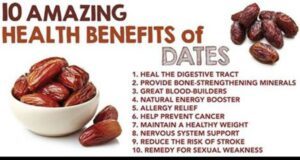Medically reviewed by Natalie Olsen, R.D., L.D., ACSM EP-C — Written by Rachel Nall, MSN, CRNA
Dates are high in natural sugar, so many people think they may not be good for them. However, these sweet fruits are packed with plenty of nutrients, making them an excellent snack in moderation.
Dates grow on date palms in small clusters. The term date comes from the Greek word daktulos, which means fingers.
Farmers harvest dates in the fall and early winter, so dates usually taste freshest at this time of year. However, many people eat dried dates, which can last for a long time in a sealed container.
In this article, learn about the health benefits of dates and how to incorporate them into a well-balanced diet.
In addition to tasting great, dates contain protein, vitamins, and minerals. They are also:
High in polyphenols. Polyphenols are antioxidant compounds that can protect the body from inflammation. Dates contain more polyphenols than most other fruits and vegetables.
Alternative to empty-calorie sweets. Dates can satisfy a person’s sweet tooth while also providing essential nutrients, such as vitamin B-6 and iron.
High in fiber. Just ¼ of a cup of dates provides 12 percent of a person’s daily fiber requirement. Fiber helps a person feel fuller for longer.
High in potassium. Dates are high in potassium, which is an electrolyte the body needs for good heart health. Potassium also helps to build muscle and proteins in the body.
Great for substitutions. People can replace the sugar, chocolate chips, or candies in baking recipes with dates to ensure they are eating natural sugars instead of refined sugars.
Nutritional information
Deglet Noor dates are one of the most common types of dates that people can find in the supermarket.
The following is the nutritional information for one average-sized Deglet Noor date:
calories: 20
total fat: 0.03 grams (g)
total carbohydrates: 5.33 g
dietary fiber: 0.6 g
sugar: 4.5 g
protein: 0.17 g
vitamin B-6: 0.012 milligrams (mg)
iron: 0.07 mg
magnesium: 3 mg
potassium: 47 mg
Risks and considerations
Dates have a very high sugar content relative to the rest of their nutritional value. People who are trying to manage their blood sugar, such as those with diabetes, should be mindful of their total sugar intake when consuming dates.
Eating dates in moderation is unlikely to raise a person’s blood sugar excessively, even if they have diabetes.
According to one studyTrusted Source, dates are a low glycemic index food that does not result in significant increases in blood sugar in people with or without diabetes.
Although the researchers had only a small sample size, their findings do indicate that eating dates in moderation should not dramatically impact a person’s blood sugar.

|
ReplyForward
|
